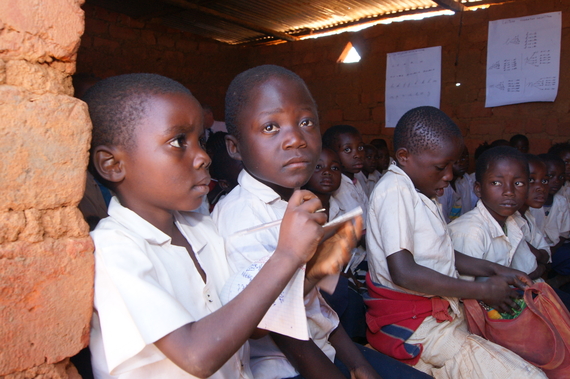This year is particularly important for our work on creating a more just and equitable world. It's the deadline world leaders set for the achievement of the Millennium Development Goals (MDGs). Among these goals was the commitment to get all children everywhere access to at least a basic education by the end of 2015--MDG 2.
Progress has been made, but not nearly enough. At this pace we will not finish the job. At this pace, the last poor girl in Africa will not have a seat in the classroom until 2086. At least 58 million children remain out of school and it is estimated that at least 250 million more are in the classroom but are not learning.
Today A World at School released a 'scorecard' on MDG 2. It's a quick look at 29 of the countries with more than 500,000 children out of school (some with several million) yet to achieve MDG 2. The scorecard shows that with 10 months to the 2015 deadline (and nearly 15 years having passed) many countries have yet to even establish solid strategies to get all children in school. Only 13 of 29 have anything they would describe as a strategy for MDG 2 and only 4 of the 29 countries have achieved the recommended levels of domestic education financing--20% of the national budget.
While the scorecard and the questions it asks give a basic overview of what is not happening, the reasons why are unendingly complex. For some countries it is a very obvious lack of political will and leadership to prioritize education. The poorest countries lack the resources to scale-up or lack the domestic reforms (like taxes) necessary to generate more resources. Some countries have made progress since 2000, but the scale of the problem was so large that even cutting the number of out of school children in half still leaves them with hundreds of thousands or even millions of children still out of school. Many countries are plagued by conflict, fragility or both--only 3 out of 29 are neither. And most importantly, those children left out of school at this point are the hardest to reach, the most vulnerable children in our world. Reaching them will be harder than those we have reached so far.
Many of these countries--some of the poorest in the world--have also seen significant declines in donor aid for education. Since 2012 at least 12 African countries have seen cuts in aid to basic education of $10 million or more.
Donor aid for education is nowhere more inadequate than in the countries and situations where it is needed most--those in conflict. In 2014 only 1% of humanitarian funding went to education--despite the fact that more than half of all out of school children live in conflict areas. This lack of investment is due to a widespread lack of understanding of the ways that education saves lives in the short and long-term, an ignoring of the demands of those living in crisis (who ask for education for their children), and a significant failure of the current funding architecture (between humanitarian relief and development) to work with donors to do whatever it takes to finish the job.
It's a bleak picture. But it can change. The changes needed to finish the job include:
- Countries yet to achieve MDG 2 must have strong, costed plans to get all children in school and scale-up education financing to at least 20% of their budget.
- Donors must keep the promise made in 2000 that "no countries seriously committed to education for all will be thwarted in their achievement of [universal access] by a lack of resources." Donors need to step up rather than continuing to fall back in terms of total funding and must better coordinate with each other and governments to avoid sudden shocks to countries when individual donor priorities change
- The gross underfunding of education in conflict and emergencies should be urgently addressed. Development and humanitarian agencies must collaborate better to mitigate the short and long-term impacts of crisis on the futures of children.
We're set up at the moment for failure at the end of 2015. Not for all children but for many of the children whose lives literally depend on the options that education will give them.
We must do better. And we must do it quickly.
Kolleen Bouchane is the Director of Policy and Research for the Global Business Coalition for Education and the Director of Policy and Advocacy for A World At School.

